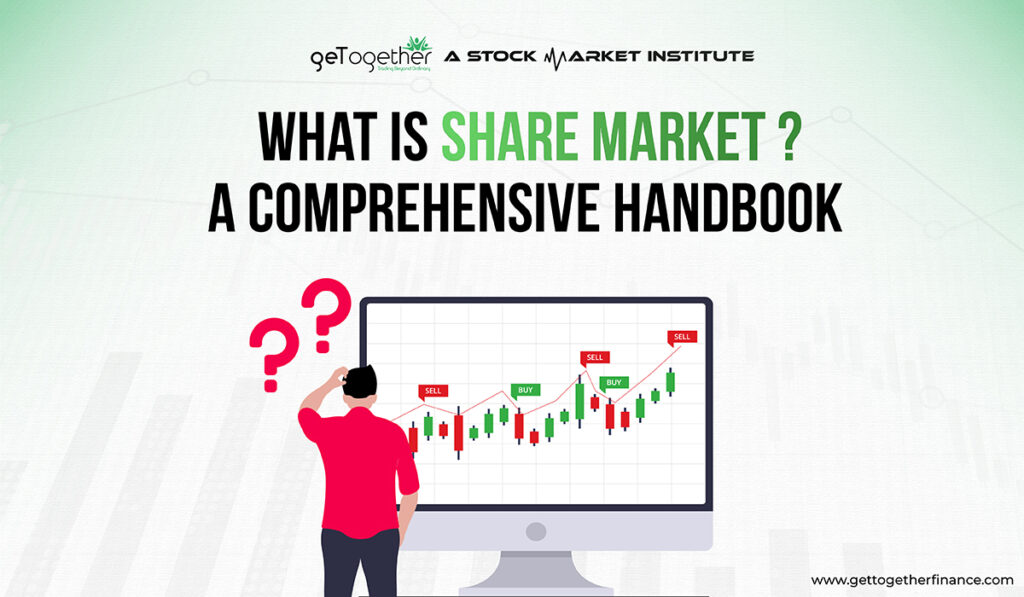What is Share Market? A Comprehensive Handbook


When it comes to investing your savings, the first thing that pops into mind is the share market, where financial securities are traded. That is undoubtedly true.
For the first time, the cumulative demat accounts in India clocked 10 crores in August 2022. Fast forward a few months, and that number crossed 11 crores in January 2023. Rising financial literacy, technology intervention, and disposable income are primarily driving retail participation in the Indian share market – Dalal Street.
But what is share market, and how does it work?
Table of Contents
ToggleWhat is share market?
A share market is a financial avenue where the general public (or retail investors) buys and sells shares of publicly traded companies, derivatives, bonds, and exchange-traded funds (ETF). In India, these trades happen in the Bombay Stock Exchange (BSE) and National Stock Exchange (NSE).
The Indian share market contains four critical components:
- Securities Exchange Board of India (SEBI): Regulates share markets in India. It facilitates the efficient and transparent working of securities markets. Also, it devises regulatory frameworks that companies, exchanges, and brokerages must follow to protect investors’ interests.
- Stock exchanges (NSE and BSE): Facilitate trade of financial assets and securities behind the scenes.
- Brokerages/Stockbrokers: An intermediary individual/firm that executes sell and buy orders for investors against a commission or fee.
- Traders and investors: Investors are individuals who purchase a company’s stocks to become its part owner. Traders buy and sell these equity shares.
How Do Share Markets Work?

Organizations raise money on share markets by selling a pre-decided portion of their ownership to investors – also equity shares of stock.
By listing their shares for sale on the share markets, organizations generate the capital essential to run and expand their businesses without taking on debt (s). In exchange for selling shares to the public, companies must reveal information and empower shareholders to contribute to corporate decisions (voting rights).
Retail investors use their money to purchase equities on the share market. As organizations use that money to improve their businesses, investors enjoy the benefits as their shares gain value over time, resulting in capital gains. What is more, they can receive dividends from companies as their profits increase.
How To Invest in Share Markets?
Demat account holders can invest in share markets in two primary ways – initial public offerings (IPO) and follow-on public offers (FPO).
What is IPO in the Share Market?

An IPO is a procedure where a private company makes shares of its ownership available to the public for the first time. The company then uses the fresh capital collected via the IPO to reduce debts, fund research & development (R&D), and expand operations.
To launch IPOs, organizations hire investment banks for the underwriting process to determine the price at which they will put their shares on sale. This involves auditing the company, including its value, financials, and future prospects, to create an underwriting document.
Then, organizations must file a Draft Red Herring Prospectus (DRHP), a document containing all the necessary information under SEBI instructions. They need to submit this document to the SEBI, Registrar of Companies, and stock exchanges.
Once organizations get approval from these authorities, they can market their IPOs on multiple channels, including news platforms, social media, and newspapers. Moreover, they rope in large institutional investors to promote their public issues and attract potential investors.
Finally, organizations announce a fixed date for the IPOs alongside the issue price ranges at which people can buy shares.
IPOs in India typically remain open for 3-5 business days for subscriptions. After people put in bids, companies finalize cut-off prices based on which shares are allotted to retail investors.
Also Read: Capital Markets
What is FPO in the Share Market?

FPOs are a way through which companies already listed on the bourses can raise fresh funds from the public and promoters. Companies announce their FPOs for the same reasons they launch their IPOs – debt reduction, expansion plans, new projects, and funding M&As.
The issue prices for FPOs are lower than the current market share price. Hence, this attracts new retail investors to purchase shares in the companies at a discount.
Since that company has already been listed on the share market, people have ample information about its financials and track record. As such, they can make more informed decisions about buying the companies’ shares.
If people invest in a company, they can claim a fraction of its profit depending on how many shares they have bought – called a dividend.
What is Dividend in the Share Market?

Dividends are the profits some companies distribute to their shareholders. These payouts happen quarterly or annually. Companies’ boards of directors decide when and how often they should announce dividend distribution.
Investing in dividend stocks is an excellent source of passive income, especially if you have bought a significant volume of shares in a particular company.
Not all companies pay out dividends. Usually, a fast-growing firm may refrain from sharing its profits with its shareholders and using them for future projects. Likewise, a stable-growth firm may credit dividends to its shareholders’ bank accounts to retain them for reinvesting.
Companies that decide to distribute dividends pick either of these routes:
- Stable: Companies consistently pay dividends every year, no matter their financial results.
- Residual: Companies use the leftover capital to pay dividends only after they meet their business objectives.
- Hybrid: Companies determine a fixed dividend that is relatively small but is easily maintainable even when during financial fluctuations.
For instance, Vedanta distributed an equity dividend of 10150.00%, amounting to ₹101.5/share from April 2022-March 2023.
Charting Your Investment Course
While understanding share market basics might initially seem overwhelming, it will arm you with the compass to navigate the complexities.
Whether you want to safeguard your financial future, hit particular life goals, or build wealth, share markets offer inflation-beating returns, making them a more attractive investment option than gold or real estate.
Remember that share markets are ever-changing owing to multiple factors, from economic indicators to global affairs. Hence, keep educating yourself, stay updated, and adjust your strategies as circumstances evolve.
FAQs
What is FPO in share market?
Follow-on public offer (FPO) is a process through which a company, already listed on the stock exchanges, issues additional shares to investors or existing shareholders following its initial public offering (IPO). Companies opt for an FPO when they need more capital for various reasons, such as expansion, debt reduction, or funding new projects.
What is PE in share market?
Put European (PE) option refers to put options. These investment contracts offer options traders the right, not the responsibility, to sell shares of a company’s stock at a particular strike price on or within a specified expiration date.
What is IPO in share market?
An initial public offering (IPO) is the first time a privately owned company sells its equity shares to the general public. Companies generally launch their IPOs to raise money for business expansion, debt reduction, mergers and acquisitions (M&A) activities, and optimizing day-to-day operations.
What is dividend in share market?
Dividend is the distribution of a portion of a company’s profits or earnings to its shareholders in the form of cash or additional shares of stock. Dividends are a way for companies to share their financial success with their shareholders and provide a return on investment to those who hold their stock. Companies announce dividend payout every quarter or year after discussing with the board of directors.
What is LTP in share market?
The last traded price (LTP) is the most recent price at which traders buy/sell shares on stock exchanges. LTP tells how a share price has fluctuated throughout the trading day, and how it will move in the near future. It serves as a critical piece of data for intraday traders, investors, and market analysts.
What is stop loss in share market?
A stop-loss (SL) is a predefined price level or order type that investors/traders place on the bourses to limit potential losses on a stock. SL orders are a risk management tool that get triggered as soon as the stock falls to the predetermined level.
What is volume in share market?
Volume is the number of shares of a particular stock that investors buy, sell, or contract during a given period, usually within a trading day. It offers insights into the level of interest and participation in a particular stock or market as a whole.
What is equity in share market?
Equity represents an investor’s claim on a portion of a company’s assets following its liquidation. Shareholders earn profits when the company performs well in the form of dividends, capital gains, and notional profits.
What is option trading in share market?
Options trading involves buying (call option) and selling (put option) shares at a specified price (strike price) on or within a predetermined expiration date. Options are financial contracts that derive value from the stock. Traders have the right but not the obligation to trade options contracts. They have to pay an upfront amount called “premium” to execute options trading.
What is IOC in share market?
Immediate or Cancel (IOC) order is a time-sensitive order where traders ask brokers to buy/sell shares immediately at the current market price. Likewise, traders instruct brokers to cancel the orders if they are completely or partially unfulfilled.
What is a block deal in share market?
A block deal involves buying and selling a significant quantity of shares in a single transaction, often exceeding a predetermined threshold set by the stock exchange. The transaction happens between institutional investors, such as mutual funds, financial institutions, and high-net-worth individuals (HNI).
What is call and put in share market?
A call option is a contract that offers traders the right (but not the obligation) to buy a specific quantity of a share at the strike price on or within the expiration date. A call option buyer expects the share price to rise in the future.
A put option is a contract that offers traders the right (but not the obligation) to sell a specific quantity of a share at the strike price on or within the expiration date. A put option buyer expects the share price to fall in the future.
What is ROE in share market?
Return on equity (ROE) is a financial metric that analyzes how well a company is minting profits on the capital raised from its shareholders. Mathematically,
ROE = (Net income/Shareholder’s equity)*100
Higher ROE is typically a positive sign for investors as it means higher returns and efficient company management.
What is SIP in share market?
A systematic investment plan (SIP) is an investment strategy where investors regularly allocate a fixed amount of money at periodic intervals (weekly or monthly) to a mutual fund (MF) scheme. They can choose the scheme, amount, and time interval. Moreover, people can start a SIP with as low as ₹500, making it suitable for investors with varying income levels.
What are derivatives in share market?
Derivatives are formal contracts that enable investors/traders to buy and sell stocks at a predetermined price and date in the future. They are primarily used to speculate on price movements, hedge against price volatilities, and manage risk. Common types of derivatives include options, futures, forwards, and swaps.
What is lower circuit in share market?
In the share market, a lower circuit is the lowest permissible percentage by stock exchanges below which investors/traders cannot trade shares during working hours. The primary triggers for lower circuits are negative market sentiments, below-par financial results, or a sudden spike in supply. Lower circuits indicate that the stock has no buyers and only sellers.
What is margin in share market?
Stock margin involves investors/traders borrowing funds from brokers or brokerage firms to purchase stocks or derivatives. It allows investors and traders to control larger positions than they could with their own capital alone.
What is Nifty in share market?
National Fifty (Nifty) is one of the two flagship indices of the India stock market, the other being Sensex. It monitors the performance of 50 large-cap companies listed on the National Stock Exchange (NSE). These high-liquidity companies come from multiple sectors, including pharmaceuticals, manufacturing, information technology, and energy.
What is QIP in share market?
Qualified Institutional Placement (QIP) is a process that publicly traded companies use to raise funds by offering shares for sale to qualified institutional buyers (QIB). These QIBs include mutual funds, scheduled commercial banks, and national investment funds. QIP offers a more streamlined and efficient process and keeps companies from completing the laborious paperwork of traditional public offerings.



 Facebook
Facebook Instagram
Instagram Youtube
Youtube
